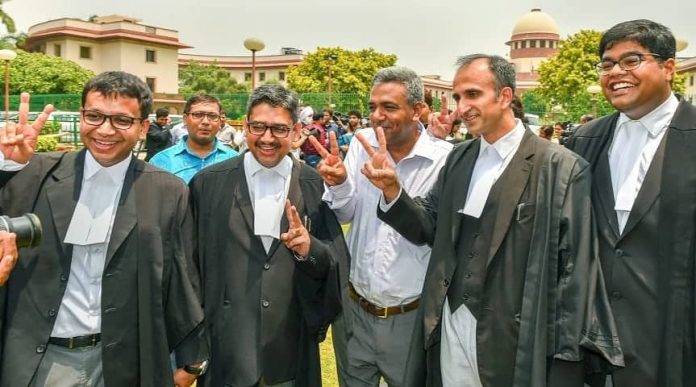
PTI photo
New Delhi (PTI): In a landmark judgement, the Supreme Court on Wednesday ruled that the Lieutenant Governor of Delhi cannot obstruct the Delhi government’s policy decisions as he has no independent power and was bound by the elected dispensation’s advice, an order hailed by Chief Minister Arvind Kejriwal as a major victory in his long-running fight for administrative powers to run the national capital.
The court also said that the Lieutenant Governor should not act as an “adversary having a hostile attitude” towards the government, but act as a facilitator, though he was not a “titular head” and differences of opinion between them should have a “sound rationale” without there being any “phenomenon of an obstructionist”.
The unanimous judgement by a five-judge constitution bench, headed by Chief Justice Dipak Misra, laid down broad parameters for the governance of the national capital, which has witnessed a bitter confrontation between the Centre and the Delhi government since the Aam Aadmi Party formed government here in 2014.
It also said the Lieutenant Governor should not act in a “mechanical manner” without due application of mind so as to refer every decision of the Council of Ministers to the President. “The LG and the council of ministers must attempt to settle any point of difference by way of discussion and dialogue,” it said.
Kejriwal, who has accused incumbent Lieutenant Governor Anil Baijal and his predecessor Najeeb Jung of preventing his government from functioning properly at the behest of the Centre and whose three-year rule has been marked with protests and dharnas with the latest being on the sofa of the Lieutenant Governor’s house, hailed the judgement as a “big victory for people of Delhi”.
Hours after the verdict, the Delhi government introduced a new system for transfers and postings of bureaucrats, a key point in the power tussle between the AAP dispensation and the Centre, by authorising the chief minister for such decisions. So far, these powers had been with the Lieutenant Governor.
However, top bureaucrats said they would not follow this new order, which may possibly trigger another round of fight between the AAP leaders and the bureaucracy.
The BJP was quick to take a dig at Kejriwal, saying he was celebrating his “loss” as the apex court had rejected the demand for absolute powers for his government and the Supreme Court must have the Delhi Chief Minister on their mind, when they wrote against anarchy as the Aam Aadmi Party leader was a “self-declared anarchist”.
Congress leader and former chief minister Sheila Dikshit dowplayed AAP’s victory proclamations and said the court ruling that the Lieutenant Governor is bound by the government’s advice was “not a vindication” for the party as “it has always been so”.
The court verdict also found resonance in Puducherry down south where Chief Minister V Narayanasamy said the judgement curtailing the powers of the Lieutenant Governor of Delhi was “totally applicable” there also and he would start contempt proceedings against those coming in way of its implementation.
The Supreme Court verdict also laid down for the first time clear guidelines for the Lieutenant Governor’s conduct, and delineated the powers of the two branches of the executive in Delhi, which does not have the status of a full state, yet elects its own MLAs and government.
The apex court said that barring three issues of public order, police and land, the Delhi government has the power to legislate and govern on other issues.
“The LG has not been entrusted with any independent decision-making power. He has to either act on the ‘aid and advice’ of Council of Ministers or he is bound to implement the decision taken by the President on a reference being made by him,” Chief Justice of India, Misra, who penned the 237-page lead verdict for himself and on behalf of Justices A K Sikri and A M Khanwilkar, said.
However, the judgement made it clear that Delhi cannot be accorded the status of a state under the constitutional scheme.
“It is clear as noon day that by no stretch of imagination, NCT of Delhi can be accorded the status of a State under our present constitutional scheme,” it said.
Terming the status of NCT of Delhi a class apart, the order said the Lieutenant Governor here was not like a Governor of a state but “an Administrator, in a limited sense, working with the designation of LG.”
Observing that the Constitution was “constructive”, it also made it clear that “there is no room for absolutism. There is no space for anarchy.”
The bench, which expressed its opinion on constitutional provisions referred to it by a smaller bench, said now the appeals arising out of the Delhi High Court order, which held that Lieutenant Governor was the administrative head, would come up before an “appropriate regular bench”.
The bench made it clear that though the decisions of Delhi’s Council of Ministers must be communicated to the Lieutenant Governor, it did not mean that his concurrence was required in every case.
The tussle between the Lieutenant Governor and Kejriwal had reached a peak earlier this year when Chief Secretary Anshu Prakash made it clear that he is answerable only to the Lieutenant Governor, which resulted in a confrontation at the Secretariat and Prakash was allegedly slapped by an AAP MLA. Subsequently, Delhi bureaucrats went on a virtual strike, refusing to attend meetings called by the ministers.
Kejriwal raised the stakes by staging a sit-in in the visitors’ lounge at the Lieutenant Governor’s residence for several days alleging that the Lieutenant Governor was repeatedly throwing “hurdles” in the way of the functioning of an elected government, before a compromise was hammered out.










